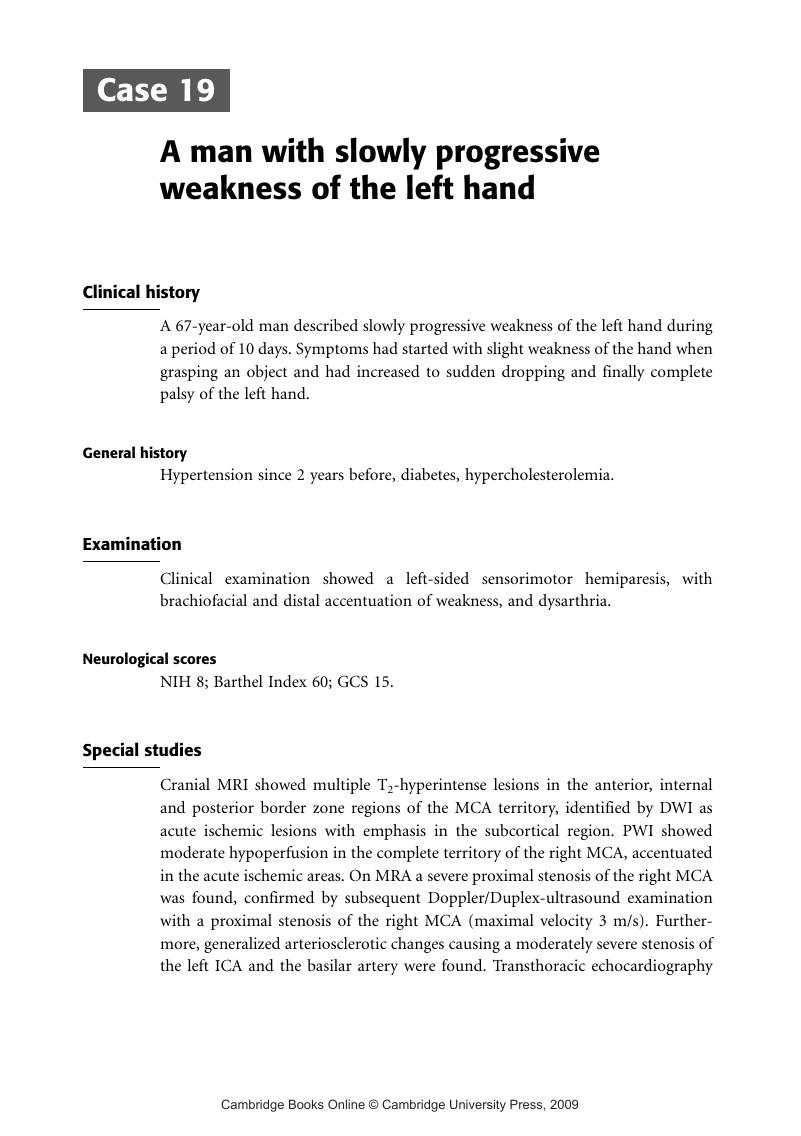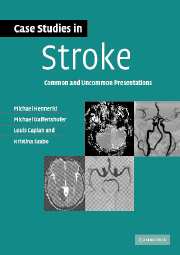Book contents
- Frontmatter
- Contents
- The following cases described herein have been published previously
- List of contributors
- List of abbreviations
- Preface
- Introduction
- Part I Common cases of stroke
- Part II Uncommon cases of stroke
- Case 13 Similar infarction – different outcome: the importance of the brain network
- Case 14 An 80-year-old woman with sudden paresis and normal motor latencies
- Case 15 Lower limb weakness after surgery
- Case 16 A young engineer with suspected MS
- Case 17 Vertigo after lifting a heavy suitcase
- Case 18 A 79-year-old man with a typical MCA-stroke?
- Case 19 A man with slowly progressive weakness of the left hand
- Case 20 Sudden weakness after holidays in Kenya
- Case 21 Recurrent spells of right-sided weakness
- Case 22 An uncommon cause of CVT
- Case 23 “My arm no longer belongs to me…”
- Case 24 Coma of unknown onset in an old lady
- Case 25 Spreading sensation of the left arm and face
- Case 26 From dysarthria to locked-in syndrome
- Case 27 The woman who could not smile on command
- Case 28 Severe headache and facial palsy
- Case 29 Isolated difficulty, writing and grasping
- Case 30 Young mother found comatose on the bathroom floor
- Case 31 Progressive mental decline and fever
- Case 32 Aphasia after laparoscopic cholecystectomy
- Case 33 Risks of carotid surgery in longstanding asymptomatic disease
- Case 34 Recurrent weakness after major car accident
- Case 35 Stroke at awakening
- Case 36 Cognitive impairment and seizures
- Case 37 Progressive headache, tinnitus, and nausea
- Case 38 Small problem with severe consequences
- Case 39 Dizzy spells and double vision
- Case 40 Bad disease with good outcome
- Case 41 Livid skin and stroke
- Case 42 Stroke mimicking vestibular neuronitis
- Case 43 Scuba diver with decompression sickness
- Case 44 Memory loss after gastrointestinal endoscopy
- Case 45 Aphasia and severe headache
- Case 46 Progressive neurological decline and fever
- Case 47 Lady who did not want to get up in the morning
- Case 48 Vermont farmer with many spells of rotating and whirling objects
- Case 49 Woman with right arm discomfort and sudden blindness
- Case 50 A 22-year-old woman with sudden right limb weakness and a mixed aphasia
- Case 51 10-year follow-up of a woman with bilateral MCA disease
- Case 52 Dysarthria reoccurring after 2 years
- Case 53 54-year-old man with AVM
- Case 54 Alternating transient numbness
- Case 55 Typical intracerebral hemorrhage – or not
- Case 56 The butcher and his wife
- Case 57 Malignant MCA infarction
- Case 58 Stroke in Recklinghausen's disease
- Case 59 Painful double vision and a “hissing” sound
- Case 60 Spontaneous resolution of PWI/DWI mismatch
- Index
- References
Case 19 - A man with slowly progressive weakness of the left hand
from Part II - Uncommon cases of stroke
Published online by Cambridge University Press: 23 November 2009
- Frontmatter
- Contents
- The following cases described herein have been published previously
- List of contributors
- List of abbreviations
- Preface
- Introduction
- Part I Common cases of stroke
- Part II Uncommon cases of stroke
- Case 13 Similar infarction – different outcome: the importance of the brain network
- Case 14 An 80-year-old woman with sudden paresis and normal motor latencies
- Case 15 Lower limb weakness after surgery
- Case 16 A young engineer with suspected MS
- Case 17 Vertigo after lifting a heavy suitcase
- Case 18 A 79-year-old man with a typical MCA-stroke?
- Case 19 A man with slowly progressive weakness of the left hand
- Case 20 Sudden weakness after holidays in Kenya
- Case 21 Recurrent spells of right-sided weakness
- Case 22 An uncommon cause of CVT
- Case 23 “My arm no longer belongs to me…”
- Case 24 Coma of unknown onset in an old lady
- Case 25 Spreading sensation of the left arm and face
- Case 26 From dysarthria to locked-in syndrome
- Case 27 The woman who could not smile on command
- Case 28 Severe headache and facial palsy
- Case 29 Isolated difficulty, writing and grasping
- Case 30 Young mother found comatose on the bathroom floor
- Case 31 Progressive mental decline and fever
- Case 32 Aphasia after laparoscopic cholecystectomy
- Case 33 Risks of carotid surgery in longstanding asymptomatic disease
- Case 34 Recurrent weakness after major car accident
- Case 35 Stroke at awakening
- Case 36 Cognitive impairment and seizures
- Case 37 Progressive headache, tinnitus, and nausea
- Case 38 Small problem with severe consequences
- Case 39 Dizzy spells and double vision
- Case 40 Bad disease with good outcome
- Case 41 Livid skin and stroke
- Case 42 Stroke mimicking vestibular neuronitis
- Case 43 Scuba diver with decompression sickness
- Case 44 Memory loss after gastrointestinal endoscopy
- Case 45 Aphasia and severe headache
- Case 46 Progressive neurological decline and fever
- Case 47 Lady who did not want to get up in the morning
- Case 48 Vermont farmer with many spells of rotating and whirling objects
- Case 49 Woman with right arm discomfort and sudden blindness
- Case 50 A 22-year-old woman with sudden right limb weakness and a mixed aphasia
- Case 51 10-year follow-up of a woman with bilateral MCA disease
- Case 52 Dysarthria reoccurring after 2 years
- Case 53 54-year-old man with AVM
- Case 54 Alternating transient numbness
- Case 55 Typical intracerebral hemorrhage – or not
- Case 56 The butcher and his wife
- Case 57 Malignant MCA infarction
- Case 58 Stroke in Recklinghausen's disease
- Case 59 Painful double vision and a “hissing” sound
- Case 60 Spontaneous resolution of PWI/DWI mismatch
- Index
- References
Summary

- Type
- Chapter
- Information
- Case Studies in StrokeCommon and Uncommon Presentations, pp. 90 - 93Publisher: Cambridge University PressPrint publication year: 2006



